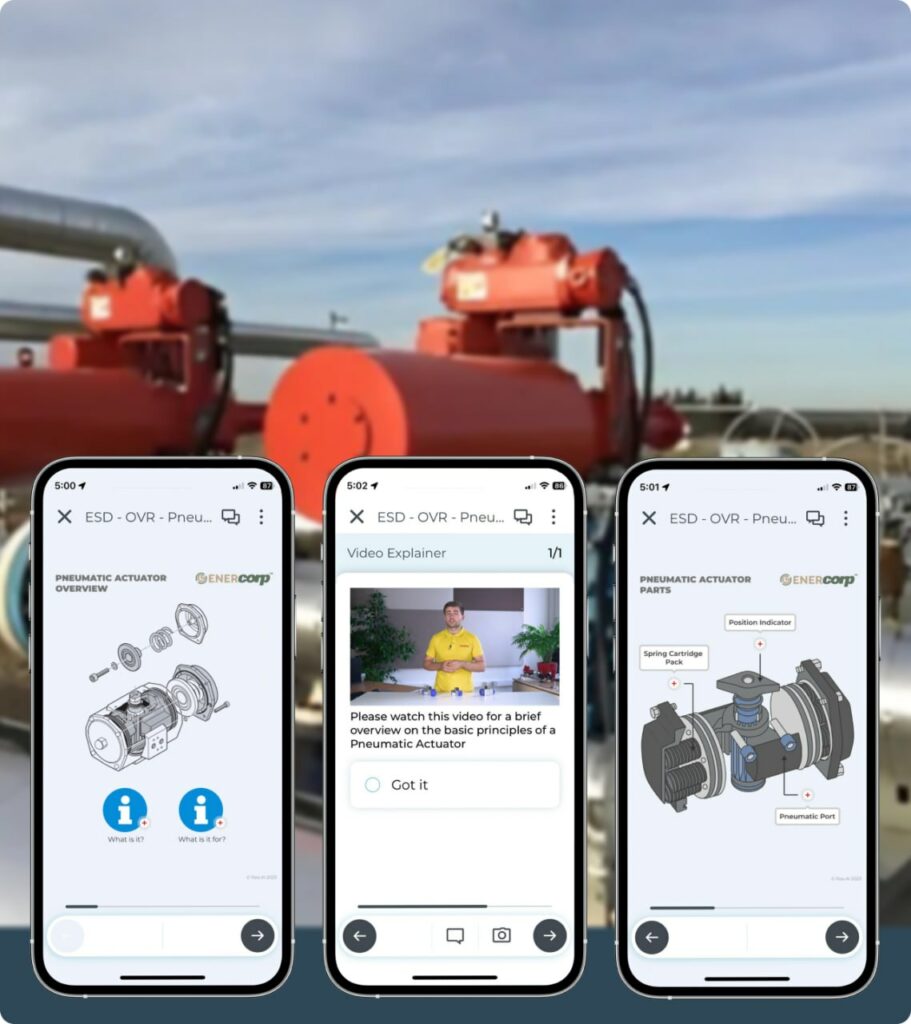
With OFS companies facing increasing skills shortages in a tight labor market, the need for effective training and development programs has never been more critical. And with the exposure to a variety of increasingly complex equipment, companies in the oil and gas industry face growing challenges ensuring the safety of their frontline workforce. Frontline operator positions in the oil and gas industry are considered the third most dangerous of all frontline positions.
Traditional training approaches such as paper-based training binders or computerized Learning Management Systems (LMS) have been the backbone of corporate training initiatives to date. However, as skills gaps widen and job requirements become more demanding, there is a growing recognition of the limitations of traditional classroom and online learning tools. In addition, for today’s workforce where attention spans are dwindling, and demands for instant knowledge escalating, it is becoming clear that classroom training alone will not suffice.
When Less Is More
In response to the needs of frontline workforces, microlearning as a companion to traditional training has emerged as a powerful tool, offering a fresh approach to training that is tailored to the needs of modern frontline workers. Microlearning is a process of delivering short, focused bursts of learning content to users, typically in the form of bite-sized modules or activities that can be consumed in minutes.

These modules are designed to address specific learning objectives. Unlike traditional training methods that rely on lengthy sessions or exhaustive manuals, microlearning emphasizes brevity and relevance, making it highly suitable for busy frontline workers. A powerful aspect of Microlearning is the ability to directly place training opportunities in context using digital tools. Microlearning on mobile devices facilitates on the spot training requests and can also be embedded in digital work instruction or inspection workflows used on the mobile devices.
Microlearning is also reported to enhance retention and comprehension by presenting information in digestible chunks, allowing learners to absorb and apply knowledge more effectively. A study from Training Magazine found that organizations using microlearning saw a 20% increase in employee productivity and a 23% increase in employee satisfactionJosh
Learning In The Flow Of Work
With today’s mobile digital technologies, microlearning can be delivered on demand and personalized based on the process, worker activity or experience level. Josh Bersin, a Deloitte Partner and head of their corporate learning practice, wrote an interesting article where he coined the phrase “Learning in the flow of work.” He sees the future of training as fusing microlearning into the digital platforms that workers use to get their jobs done. And he points to studies showing that 49% of workers want to consume training at the point of need.
Opportunities For Microlearning in Frontline Workforce Training
- Faster Onboarding: Microlearning is particularly effective for onboarding new frontline employees. Instead of overwhelming them with extensive training sessions away from work, orientations can be shortened and supplemented with microlearning assignments to deliver essential information in short modules, providing repetition and allowing new workers to grasp key concepts gradually.
- Ensuring Compliance: Compliance with regulations and company policies is crucial in the oil and gas industry. Microlearning offers an efficient way to deliver and reinforce compliance training, breaking down safety procedures into easily understandable modules that employees can complete at their own pace. And using digital platforms, training completion can be tracked and monitored easily.
- Skill Enhancement: Frontline workers often require specific skills or knowledge of specific equipment operating procedures to perform their duties effectively. Microlearning can provide targeted skill enhancement modules that employees can access whenever they need to brush up on particular areas.
- Just-in-Time Guidance: Frontline workers may encounter unfamiliar situations or unexpected challenges on the job. With easy access to training on equipment, operating procedures and safety guidelines, Microlearning provides access to relevant information quickly, delivering just-in-time support to resolve issues, make informed decisions and minimize non-productive time..
Evolving Training From Obligation To Resource
Often training programs in the oil and gas industry are viewed by workers as an obligation that adds additional time and effort to their job. Traditional training courseware and classroom approaches tend to reinforce this perception by employing long, dense course experiences that often require time off the job or outside of work. It is not an approach that invites voluntary repetition. EnerCorp, an innovative supplier of Sand Management and eFlowback services, set out to change that impression by leveraging microlearning modules available on personal mobile devices.
Using Microlearning modules as part of the standard classroom training courses both familiarized workers with the Microlearning courseware and also increased engagement and participation during the classes. Microlearning modules included illustrations, video and quiz questions which were used during class to foster discussions. The EnerCorp training team also developed a series of skills and equipment based Microlearning modules and added a training content section to the mobile digital platform they were using for digital inspections and maintenance in the field. Said one EnerCorp field technician, “I wish I had this when I started 20 years ago.”
By delivering easy access to critical training in efficient, engaging formats, the EnerCorp team has their sites set on making a real difference for the company. Not only striving to improve frontline workforce productivity and safety, but also changing the frontline workforce’s perception of training from an obligation to a resource that is at their disposal 24/7.
Taking A New Approach
While the limitations of traditional training and LMS solutions are becoming more evident, the combination of Microlearning with the availability of frontline digital platforms on mobile devices is creating new opportunities for training in oil and gas companies. To help bridge skills gaps and ensure workforce safety in a dynamic and increasingly complex environment, Microlearning courseware delivered at the point of need can make significant improvements in overall training programs. Key benefits such as faster onboarding, improved compliance and on the spot guidance are a few of the benefits companies can achieve by making “more with less” using Microlearning as a supplement to traditional training.
Stephen Zocchi is CMO at ROO.AI. After building software to help salespeople quickly and easily price and configure complex equipment, he joined ROO.AI to create a new mobile platform to guide and assist frontline workers in Oil & Gas and MTO Manufacturing.
Share This:
Next Article




